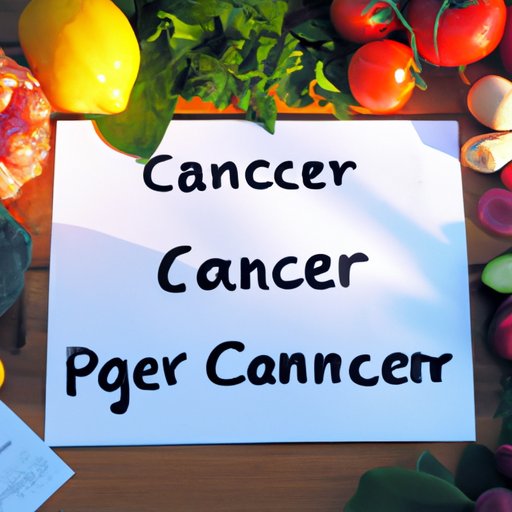
Introduction
Cancer is one of the leading causes of death worldwide, and prevention is key to reducing its impact on individuals and communities. While genetics plays a role in cancer risk, lifestyle factors are also significant contributors. By adopting healthy habits and making lifestyle changes, you can lower your risk of developing cancer and improve your overall health.
Common Cancer-Causing Habits
Smoking, excessive alcohol consumption, and poor diet are among the most common cancer-causing habits. Smoking is a leading cause of lung cancer, but it can also increase the risk of other cancers, such as bladder and pancreatic cancer. Excessive alcohol consumption is linked to an increased risk of breast, colon, liver, and esophageal cancers. A diet high in red and processed meats, saturated and trans fats, and sugar can increase the risk of several types of cancer, including colorectal, pancreatic, and endometrial cancer.
To avoid these habits, try to quit smoking, limit alcohol consumption to moderate levels, and adopt a healthy diet. Choose a diet rich in plant-based foods such as fruits, vegetables, whole grains, and lean proteins such as fish and chicken. Avoid processed and fried foods and sugary drinks.
The Importance of Exercise
Regular physical activity is essential for maintaining a healthy weight, which can help reduce the risk of many types of cancer. It also reduces the levels of hormones such as estrogen and insulin, which can contribute to cancer development. The American Cancer Society recommends at least 150 minutes of moderate-intensity exercise or 75 minutes of vigorous exercise per week, along with strength training exercises at least two days per week.
Some excellent forms of exercise include walking, jogging, swimming, cycling, and strength training with weights or bodyweight exercises. If you’re new to exercise, start slowly with low-intensity workouts and gradually increase the intensity and duration.
Encouraging Regular Screenings
Cancer screenings are essential for early detection and treatment of cancer. The exact age and frequency of cancer screenings depend on the type of cancer and individual risk factors. For instance, women should get regular mammograms starting at age 50 or earlier if they have a family history of breast cancer. Men over 50 should get regular prostate cancer screenings, and individuals over 50 should get a colonoscopy every 10 years.
To determine the right screening schedule for you, talk to your doctor about your personal and family medical history. Early detection of cancer can improve the chances of successful treatment and recovery, so don’t hesitate to get screened.
The Benefits of a Plant-Based Diet
Studies have shown that a diet rich in fruits, vegetables, legumes, and whole grains can help reduce the risk of several types of cancer. The antioxidants, vitamins, and minerals found in these foods provide essential nutrients that help boost the immune system and fight inflammation in the body, reducing the risk of cancer cell growth.
To incorporate more plant-based foods into your diet, try adding fruits and vegetables to each meal, choosing whole-grain bread and pasta, and snacking on nuts and seeds. Try to avoid red meat and processed foods, and choose lean proteins such as fish, tofu, or tempeh. If you’re not sure how to prepare plant-based meals, consider working with a registered dietitian to develop a healthy meal plan.
Exploring Natural Remedies
Natural remedies such as turmeric, green tea, and garlic have anti-cancer properties that can help reduce cancer risk. Turmeric contains curcumin, which has been shown to inhibit the growth of cancer cells. Green tea contains catechins, which can help reduce the risk of several types of cancer, including breast, prostate, and lung cancer. Garlic contains sulfur compounds that have been shown to help prevent cancer development.
While natural remedies can be helpful, they are not a replacement for a healthy lifestyle and should be used in conjunction with other prevention methods. To incorporate natural remedies into your diet, try adding turmeric to soups and stews, drinking green tea as a daily beverage, and adding garlic to sauces and marinades.
Providing Resources for Support
Preventing cancer can be challenging, but there are many resources available to help. Support groups, online forums, and other resources can provide advice, guidance, and encouragement to those who are looking to adopt a healthier lifestyle. Whether you’re looking for help quitting smoking, starting an exercise routine, or incorporating plant-based foods into your diet, there are many resources available to help you achieve your goals.
Some resources for cancer prevention include the American Cancer Society, the National Cancer Institute, and the World Health Organization. You can also search online for support groups and forums related to cancer prevention and healthy living.
Conclusion
Preventing cancer is a multi-faceted approach that requires adopting healthy habits and making lifestyle changes. By avoiding common cancer-causing habits, incorporating regular exercise and plant-based foods into your diet, and getting regular cancer screenings, you can significantly reduce your risk of developing cancer. Remember to seek help and support when needed, and always consult with your doctor before making any significant lifestyle changes.




